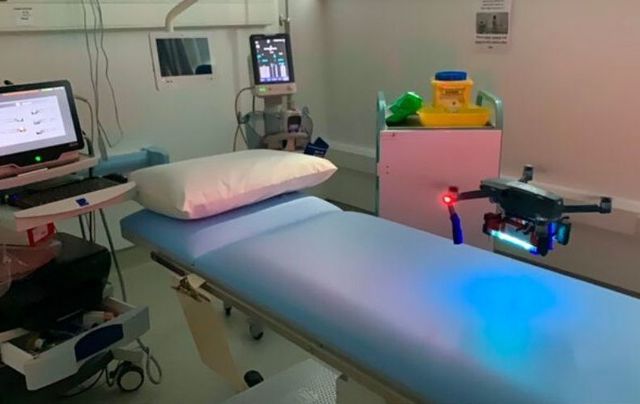Scientists in Galway and Limerick have developed an ultra-violet drone that sterilizes public spaces at night as a means to curb the spread of COVID-19.
The UV drones would be used to sterilize public spaces like cafeterias, public toilets, supermarket checkouts, airport terminals, and train stations.
Research teams from the University of Limerick and the National University Ireland, Galway (NUIG) had previously developed a drone that carried insulin to diabetic patients on the Aran Islands and have teamed up again for this innovative project.
The team was able to develop a drone that carries ultra-violet lights and flies autonomous routes thanks to their experience from the Aran Islands project.
The UV drone is designed to fly pre-planned routes at night time to minimize human contact and sanitize public spaces for the following day.
Ultra-violet light band C is used frequently in hospital settings to disinfect surfaces, but it is harmful to humans and can damage skin if people come in direct contact with it.
Read more: Irish scientist leads Oxford COVID-19 vaccine drive considered most promising
The drone, therefore, is designed to fly autonomously at night when public spaces like cafeterias are likely to be unoccupied.
Professor Derek O'Keeffe, who led the project along with Dr. Kevin Johnson and Dr. Ted Vaughan, said that the technology could become extremely popular for cleaning public space.
Rise of the Machines : An Ultraviolet C Drone @UVCDrone We have developed a novel germicidal solution to help in the fight against #COVID19 which can operate autonomously in unoccupied shared public spaces @HIVE_LAB @DrKevinJohnson4 @VaughanTed #MedTech https://t.co/1COvmIiecv pic.twitter.com/RJuJJcwIVl
— Derek O'Keeffe (@Physicianeer) June 3, 2020
He told RTÉ News that the drone was more environmentally beneficial than using traditional cleaning methods like chemicals.
"It cleans the area by delivering the UV light and it's environmentally friendly as opposed to chemicals. Then when it has finished cleaning and sanitizing the area, it comes back and lands again to be charged and ready to go for the next day."
He said that delivering UV light from a height near the ceiling allows the light to disperse more efficiently and reach surfaces that may have been missed.
Read more: Dublin scientists develop Covid-19 virus killing robot




Comments